7 Driveway Alternatives That Get You Away From Asphalt
Author: Rick Worst | Editor: Omar Alonso
Review & Research: Jen Worst & Chris Miller

Till recently, most driveways you would encounter were made of asphalt and not driveway alternatives. While some prefer concrete over asphalt because of its durability, the latter is not free of problems.
Asphalt driveways are known for potholes that appear, sometimes, out of nowhere. These can be anywhere from a couple of inches to many feet long. The small ones are easy to patch but the big ones take some work.
You must also be wary of cracks on these driveways. If you neglect them, they are likely to spread and turn into holes especially when caused by the likes of spiders.
It’s not tough to fix them but it does take some time and effort. We've talked about garage floor crack repair which is similar if you need help.
7 Driveway Alternatives
So, we thought it would be a good idea to give you some concrete alternatives. Take a look and see what catches your eye and then you can dig deeper after narrowing down your choices.
Pavers
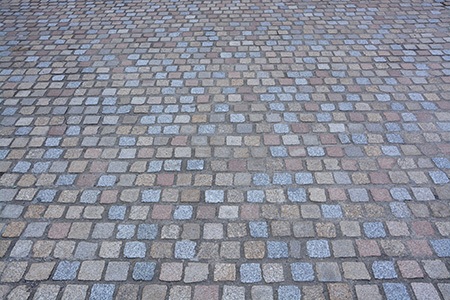
The first suggestion for an alternative driveway is permeable pavers combined with gravel. This is a great alternative to crushed asphalt driveways or any other types of driveways if you want something that looks great.
The residential options out in the market keep the gravel locked in place which means you don’t have to worry about redoing them anytime soon.
Many of them come in square shapes but you can find them in different colors and shapes with a little research.
They are also made of recycled plastic that is applied on gravel which makes it easy to lay them in any pattern. On top of that, this structure gives them strength and they are eco-friendly too.
Most types of pavers are also an affordable option when compared to concrete and are durable driveways. The ones made of concrete can be expected to last 30 to 40 years.
You might have to seal them occasionally but with minimum regular maintenance can expect them to last about 25 to 60 years based on the footfall.
Concrete pavers are a good alternative driveway material if you are expecting truck traffic because they don’t crack so easily. And thanks to the flex joints and vertical compression strength, the pressure is evenly distributed across the grid. They are interlocked which keeps them flexible and strong.
Pavers are a great solution for homeowners who want cost-effective and easy solutions. They can also be laid in different patterns which means you can take the same thing that everyone else has and still make it look unique.
If you are a DIY enthusiast, you can get to work yourself. Otherwise, there are plenty of professionals who will do it for you. Pavers make great patio surface alternatives as well.
Concrete

You may be thinking of your typical asphalt driveway or street when we say "concrete," but we're really referring to smoothed and polished surfaces like you may find inside of a garage.
But it's more than that. You can stamp patterns into concrete, stain it in any various beautiful colors, seal it, and more. It's possibly the most versatile of the driveway alternatives, though least adventurous.
You can stamp in textures and really design it any way you would like. It's pretty low maintenance as long as you aren't dropping incredibly heavy things on it and cracking it. I suspect most of you are looking for concrete driveway alternatives though, since concrete is similar to asphalt.
Brick

If you’re trying to move away from concrete, brick is the most popular and obvious choice. That’s because, for one, it is easy to procure and lay. But it is also the choice because it allows water to be absorbed between the bricks if you plan it well.
So, if you are looking for a permeable driveway to make sure that stormwater passes without any hassles, a driveway made of bricks is an excellent choice. Not only that bricks also help you avoid puddles and giant ruts.
Bricks are also a fairly affordable alternative driveway material. They are certainly cheaper than concrete and asphalt options. They are relatively eco-friendly and it is easy to jazz them up with a few natural stones in the mix.
However, the problem with this layout is that weeds tend to make their way into the gap in between the bricks. But it’s not an unsolvable problem as you can permanently get rid of weeds in a driveway. The most tedious way, of course, is to pull them by hand. But it is quite effective and the least expensive one.
You can make it easier on yourself by wetting the area because that loosens the soil. You can also use tools like kitchen knives or V-notch weeders that are meant to tackle weeds in narrow spaces.
Another way to deal with weeders is to use boiling water which is a cheap and natural remedy. This kills the seeds and the roots which means you don’t have to worry about them regrowing anytime soon.
Point is, there are lots of ways to get rid of the weeds which is a major concern with brick driveways. So, put your mind at ease and go for it.
Recycled Materials
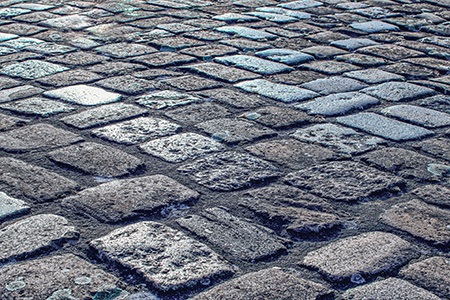
If you want to stand out in the neighborhood and show you're doing your part, you can design your driveway with recycled materials. This can be rubberized material from used tires.
It can be other cheap driveway alternatives such as a combination of gravel, brick, and stones. The choices are yours and the way you lay them out to be aesthetically pleasing is up to you as well.
The key is that you're using materials that would otherwise go to waste, and thus contributing back to the world.
Gravel
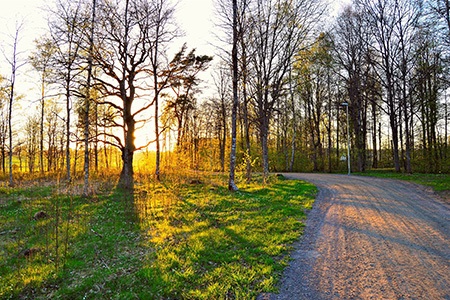
If you’re looking for something cheap with a great look, gravel is a great option. The installation is quite affordable and gravel is kind of permeable when compared to concrete. Even with gravel and dirt you need to wary of how close the driveway is to the property line, still.
Typically, this driveway will be made of hard and angular gravel all over the space. Over time, the gravel might become loose depending on the amount of traffic the driveway sees.
But you can just remove the loose stuff and reapply gravel to even out the surface. That is also an easy and inexpensive process. It's definitely the most accessible of the do it yourself driveway alternatives.
Now, storm water can pass through gravel driveways too because they are sort of permeable. But if you have more than a seven percent slope, gravel can be a tricky material. On the other hand, if you have grass on either side, gravel driveways look great.
The gravel also does not break so you don’t have to worry about repair work. Just make sure you take care of the maintenance. If you live in a place where there is snow in the winter, you might want to remember that it will not pile up on your driveway which makes it a safer option.
If you place barriers on the edges, the gravel will stay in its lane. But there are some issues with this material. You need to rake it often and make sure the surface is even. You also need to replace it every two years or so even with regular maintenance.
When they wear out, gravel driveways look dirty. And while the ice does not pile up, it is kind of hard to remove it from the surface. Scraping is not an option because that will lead to more fixing once the snow is cleared up.
Choosing gravel as one of your driveway alternatives means you'll be making choices from materials such as crusher run (quarry process), pea gravel, crushed stone #411, blackstar or blacktrap rock, jersey shore gravel, or marble chips. The look can vary greatly depending on these choices.
Cobblestone
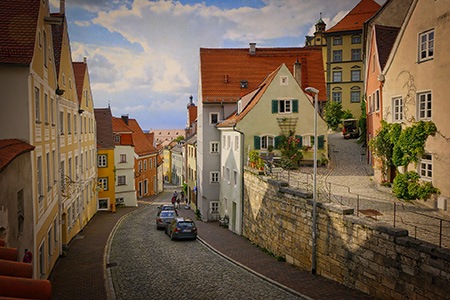
This is another great idea for those who are looking for a driveway with natural stones. Typically, cobblestones are small types of concrete blocks of rocks that are also called concrete pavers.
But some manufacturers use cast concrete bricks and call them cobblestones. The real cobblestones come in the likes of granite, limestone, and even basalt.
They look like rounded stones, a little like pebbles collected from streams that are used in gardening. Cobblestones come in many shapes but the Belgian blocks are extremely popular.
These stones are uniformly sized and shaped which means installing them is easier when compared to rounded cobblestones.
Now, they are a bit pricey as you might expect but the stores do last a really long time. They have a vintage appeal and look really charming while also adding value to the property, among other benefits of cobblestone driveways.
Cobblestone driveways don’t need too much maintenance apart from a wash a couple of times a year. Weeds are also a possibility that need to be taken care of from time to time.
But otherwise, cobblestone driveways can last a century. And when it is time to redo the driveway, you will find that the stones are perfectly fine.
It’s the base that will need fixing in these driveway alternatives, especially if it is sand that tends to wash away over time. In that case, you just need to add more sand into the joints. This is more the case with driveways that see high traffic.
But instead of sand, if you’re going to use mortar, you might run into some problems. If you lie in a region with cold temperatures, the joints might crack sooner than expected. So, you need to keep an eye out for that.
Tar & Chip
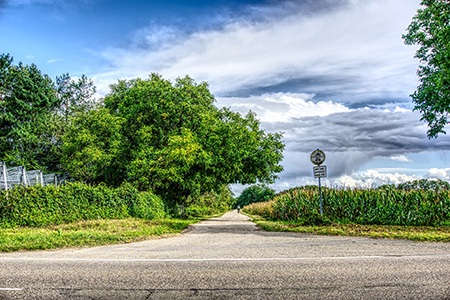
Here’s another cheap alternative to asphalt driveways. Fair warning, it is not going to look pretty or have a smooth finish but it is very affordable.
These driveways essentially have a gravel base and hot tar is poured over them. Then, stones or chips are placed on the top and the whole sandwich is pressed down with a road roller.
This is a good option for homeowners who want their driveway to be functional. It is also capable of standing out if everyone in your neighborhood has opted for pavers of some kind.
But you must remember that over time, the stones will become loose. However, it is easy to pave them back while staying budget friendly.
In fact, even that costs only half of what an asphalt driveway would cost you. Maintaining these driveways is also very easy because other than getting the space rid of loose stones, there isn’t much needed.
You don’t have to seal it and if it is a lighter color, it will not absorb as much heat. That means you can take a nice walk on it on a sunny day. That’s not what a driveway is for but if you do, we won’t judge.
Driveway Alternatives for Those Who Dislike Asphalt
We started this piece as a way to give you alternatives to asphalt driveways. And the worst thing about them is that they can create sinkholes if the earth beneath the material shifts.
And it doesn’t even take a lot for this to happen. If the base layer is badly installed, you can expect this nightmare on your driveway.
While that doesn’t happen with the other materials, you might want to keep in mind that an unsteady base layer will lead to a lot more maintenance than needed even in your driveway alternatives.



